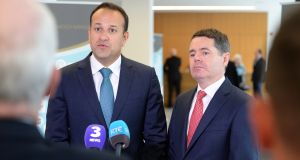Varadkar to allocate €1bn extra for infrastructural spending
Taoiseach has said Ireland’s economic growth at risk if such spending not increased
Taoiseach Leo Varadkar is to use his first budgetary set piece to allocate at least €1 billion extra towards infrastructural spending while also committing to a so-called “rainy day fund”.
Minister for Finance Paschal Donohoe is set to outline the Summer Economic Statement, which will mark the beginning of the budgetary process, in the coming weeks.
Mr Varadkar and Mr Donohoe are set to use the platform to give effect to the Taoiseach’s promise, made during the campaign for the Fine Gael leadership, of greater infrastructural spending.
The exact level of infrastructural spending to be outlined in the Summer Economic Statement has yet to be determined but discussions are ongoing in Government.
Growth risk
Mr Varadkar has said Ireland risks future economic growth if such spending is not increased. He said projects such as the Dublin Metro, the M20 motorway between Cork and Limerick and motorways to the north and northwest of the country are needed.
During his leadership campaign, Mr Varadkar also indicated he would not keep to former Minister for Finance Michael Noonan’s plan to allocate €1 billion a year to a rainy day fund from 2019 onwards.
However, alternative plans are being examined, such as redefining funds held by the Irish Strategic Investment Fund (ISIF) and the National Treasury Management Agency (NTMA) for so-called “rainy day” purposes.
Such a fund is contained in the confidence-and-supply deal with Fianna Fáil, and the party’s finance spokesman Michael McGrath has reminded Fine Gael of this deal in recent weeks.
Informal discussion
“I have had one informal discussion with Minister Donohoe where we talked about a number of issues, but I did take the opportunity to remind him that the rainy day fund is a confidence-and-supply issue and we expect it to be established,” Mr McGrath said.
Earlier this month, Mr Donohoe told the Dáil the existing capital investment plan, which spans the five years between 2016 and 2021, commits to increasing spending by €5.14 billion.
Sources said this figure is likely to be revised upwards in the Summer Economic Statement in Mr Varadkar’s first big policy move, with some sources mentioning a figure of above €1 billion.
Other senior Government sources, however, cautioned against estimates since talks are ongoing.
The Taoiseach confirmed on Wednesday that there will be a “rainy day” fund, but did not outline how it would be structured.
“That’s something we’ll be working on and clarifying in the Summer Economic Statement,” he said.
Mr Varadkar also said he is determined to cut income taxes in the October budget, even if that means raising other taxes.
The Taoiseach said he is not ruling out other revenue-raising measures to pay for reductions in income taxes, and gave the previous example of increasing duties on cigarettes.
Squeeze extra money
Mr Varadkar also indicated he would seek to squeeze extra money from existing Government resources.
He said he believed there could be as much as €530 million of “hidden fiscal space” in additional savings and reallocated funds.
Mr Varadkar’s first budget will be very tight, with the so-called “fiscal space” – the amount of new money that can be spent – estimated be around €550 million. This figure, however, includes money that will be spent on the public sector pay deal.
The confidence-and-supply deal commits the Government to splitting available resources on a two-thirds to one-third basis in favour of public spending over tax cuts.



